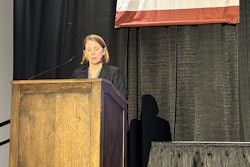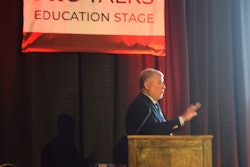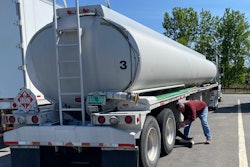It's now a rule of the road, so to speak -- the Department of Labor's six-factor independent contractor test for contractor/employee determinations under the Fair Labor Standards Act went into effect March 11, noted transportation attorney Greg Feary of the Scopelitus firm. Feary was speaking Monday to attendees of the Truckload Carriers Association's conference in Nashville, Tennessee, where he dispelled notions proffered by some that the DOL's new test represented California's AB 5 and its very problematic ABC test's arrival in Washington, D.C.
This isn't DOL "taking our jobs away," he said, paraphrasing language heard from some owner-operators leased to motor carriers, a sentiment also expressed by some members of Congress drawing an analogy between the ABC test and DOL's new rule. "The DOL independent contractor test," though, Feary said, is "not cut and dried like AB 5. ... It's a rollback to the economic realities test, which is a six-factor test."
Failure of one of the six parts of the test doesn't totally rule out contractor status, unlike in the three-part ABC test. Given the test was adopted for purposes of enforcement of the FLSA, too, its application in trucking is limited, as Feary outlined in prior reporting.
 Greg Feary speaking from the stage at TCA's Truckload 2024 conference
Greg Feary speaking from the stage at TCA's Truckload 2024 conference
[Related: DOL's final independent contractor rule under fire in Congress, courts]
"Plaintiff’s attorneys just got a big gift from the Department of Labor," Feary said, with "north of 290 pages full of citations and arguments made by hundreds of government attorneys trying to put their thumb on the scale ... to argue that workers are employees and not ICs." Feary's referring to voluminous text that accompanied the issuance of the rule itself, and engagement in it by attorneys looking to make a buck via potential class action cases. "Our firm alone has more than a hundred it's defending" at present. "Plaintiffs are more educated from simply reading this rule."
Its significance, thus, is indirect with regard to state wage and hour lawsuits and private actions, yet it could be significant indeed depending on the situation of owner-op contractors at any given company.
Feary re-emphasized various points for carriers and contracted owner-operators to avoid running afoul of the test:
- Forced dispatch is particularly problematic. That's because of the "Nature and Degree of Control" factor within the test, but not only that factor. "In that final rule," Feary said, regulators note "we're convinced that accepting or turning down dispatch ... is indicative of opportunity for profit or loss," another factor in the test.
- Negotiation of rates on individual loads or in carrier contracts. Evidence of negotiation between a contracting owner and carrier, whether with respect to loads or contract terms themselves, can help satisfy the control and profit/loss factors, too. Though negotiation might be rare on the front end of an owner-operator contracting process, Feary said, it's not when it comes individual loads. "What doesn't happen with motor carriers," though, he added, "is you don't archive that evidence" of negotiation taking place. "And so when we come in and say, 'We're going to have to prove that you're negotiating,' you don't know where the evidence of that is, even though you know it has occurred. And then we have to rely on testimony. And that's not as solid as emails that occurred a year ago, two years ago, three years ago."
- Safety requirements that exceed those prescribed by regulation. Regulators at DOL listened to commenters on the proposed rule, changing the final rule to the benefit of highly regulated industries like trucking. The final rule abandoned what's known as the "Scantland Principle" in law. Summed up, the principle goes something like this: If you’re in a highly regulated industry, your workers are probably employees. The final rule excluded from control considerations safety requirements carriers impose on owner-ops because they're required to by regulation. If company policies go farther than that -- say, requiring an owner pulling in a 2015 glider with a pre-2000 engine under the hood to run an electronic logging device, or any contracted operator to use an in-cab camera -- that could be seen as control, weighing toward employee status.
"Have your contracts reviewed," said Feary, "Look at driver qualifications," negotiate and archive evidence of it, and carriers and their owner-operators might rest easy with respect to the rule now in place.
Enforcement directly from DOL investigators, Feary felt, might be unlikely given it's currently an election year. During the last year of the Obama administration, he noted, DOL published guidance around classification with similar stipulations. "That was 2016, and frankly no one really expected Trump to win that election" and bring a change in political party at the top of the administration, Feary noted. Yet even so, DOL investigators proceeded with caution, slowing "their efforts to start audits and assessments in a similar era. The same thing is going to happen, probably," this year, he said.
Congressional efforts to void the rule have seen action in recent times, at least in the House of Representatives, and legal challenges are mounting. In addition to the case reported in Overdrive as brought in the Eastern District of Texas, Feary noted at least two other challenges in process, too. Interests among the plaintiffs include many more than just those of trucking companies, big associations like the American Trucking Associations and others. As in the Texas-filed challenge, the U.S. Chamber of Commerce, even, has joined on the side of plaintiffs.
The Congressional Review Act resolution in the U.S. House, while making progress, has a steep hill to climb. Last week, it passed the House Committee on Education and Workforce, but it still has to pass both the full House and Senate and be signed by the president -- a highly unlikely scenario. If it makes it to the president's desk and is vetoed, it has to pass by two-thirds of the members of each chamber to be enacted.
"There's a lot going on in the background," Feary said, that could yield progress.
[Related: Are leased owner-operator truly 'independent' contractors for fair-labor-law purposes?]










